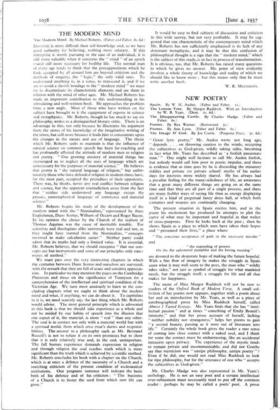THE MODERN MIND
The Modern Mind. By Michael Roberts. (Faber and Faber. Ss. 6d.)
NOTHING is more difficult than self-knowledge and, as we have good authority for believing, nothing more salutary. If this enterprise is worth pursuing in the case of an individual, it is
still more valuable when it concerns the " mind " of an epoch —and still more necessary for healthy life. The normal man of every age tends to think that the presuppositions which he finds accepted by all around him are beyond criticism and the methods of enquiry, the " logic," the only valid ones. To
understand anything is, in a sense, to transcend it, and if we are to avoid a slavish bondage to the " modern mind " we must try to discriminate its characteristic elements and see them in relation with the mind of other ages. Mr. Michael Roberts has made an important contribution to this understanding in his stimulating and well-written book. He approaches the problem from a new angle. Most of those who have written on the subject have brought to it the equipment of experts in science and metaphysics. Mr. Roberts, though he has much to say on philosophy, writes as a distinguished literary critic. There is an advantage in this, not only because he illustrates his argument from the stores of his knowledge of the imaginative writing of the times, but still more because it leads him to concentrate upon the changes in the nature and use of language. The thesis which Mr. Roberts seeks to maintain is that the influence of natural science on common speech has been far-reaching and has profoundly affected the attitude of modern men to religion and poetry. " Our growing mastery of material things has :ncouraged us to neglect all the uses of language which are unnecessary for-the purposes of material science." He believes that poetry is " the natural language of religion," but unfor- tunately those who have defended religion in modern times have, for the most part, accepted the prejudices of their opponents. There was, he thinks, never any real conflict between religion and science, but the apparent contradiction arose from the fact that " neither side understood any language except the prosaic, unmetaphorical language of commerce and material science."
Mr. Roberts begins his study of the development of the modern mind with the " Nominalists," represented by three Englishmen, Duns Scotus, William of Occam and Roger Bacon. In his opinion the choice by the Church of the realism of Thomas Aquinas was the cause of inevitable trouble. For scientists and theologians alike universals were real and not, as they might have learned from the Nominalists, " concepts invented to make calculation easier." Neither party could admit that its truths had only a limited value. It is essential, Mr. Roberts believes, that we should recognise " that our con- cepts are but instruments and some of our principles only state- ments of method."
We must pass over the very interesting chapters in which the centuries between Duns Scotus and ourselves are surveyed, with the remark that they are full of acute and sensitive apprecia- tion. In particular we may mention the pages on the Cambridge Platonists and those on the significance of Tennyson for a comprehension of the intellectual and spiritual condition of the Victorian Age. We turn most anxiously to learn in the con- cluding chapters what we ought to think about the modern mind and what, if anything, we can do about it. To capitulate to it is, we need scarcely say, the last thing which Mr. Roberts would advise. The most general principle which is advocated in this book is that we should take experience as a whole and not be misled by our habits of speech into the illusion that one aspect of it, the material, is more " real " than any other. The soul is in contact not only with a material world but with a spiritual world, from which arise man's duties and responsi- bilities. The answer to a philosophy such as Mr. Bertrand Russell's is not to refute it on its own premi.sses but to show that it is only relatively true and, in the end, unimportant. The full human experience demands expression in religion and through religion the soul reaches truth which is more significant than the truth which is achieved by scientific method. Mr. Roberts concludes his book with a chapter on the Church, which is at once a defence of the necessity of a Church and a searching criticism of the present condition of ecclesiastical institutions. One pregnant sentence will indicate the basis both of his defence and of his criticism : " The business of a Church is to foster the seed from which new life can grow."
It would be easy to find subjects of discussion and criticism in this wide survey, but not very profitable. It may be sug- gested that one-characteristic of the contemporary mind which Mr. Roberts has not sufficiently emphasised is its lack of any dominant metaphysic, and it may be that this confusion of philosophical thought is a sign that the " modern mind," which is the subject of this study, is in fact in process of transformation. It is obvious, too, that Mr. Roberts has raised many questions to which he gives no answer. His point of view evidently involves a whole theory of knowledge and reality of which we should like to know more ; but this means only that he must write another book.
W. R. MATTHEWS.










































 Previous page
Previous page